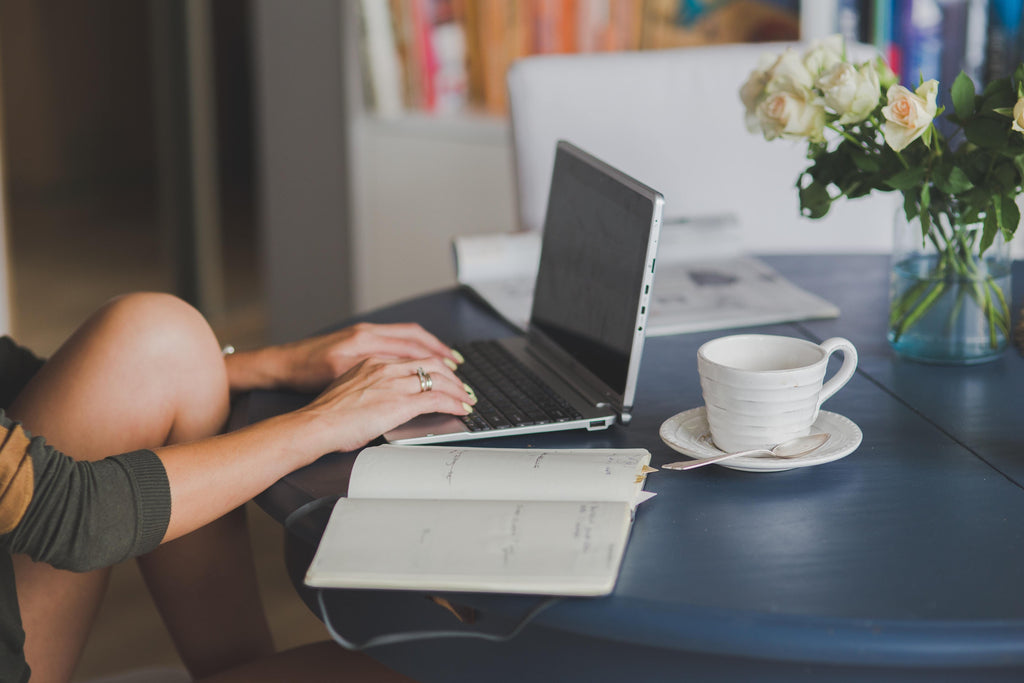Trouble sleeping after that afternoon cup of joe?
If you want to keep your sleep without ditching your daily java, this article is for you.
See, you don’t have to choose between a good cup of coffee and a good night’s sleep. Don’t believe us? Below, we’ve put together eight helpful, science-backed tips so you can keep your deep sleep – and your bean routine too.
Ready? Let’s get into it.
How Does Caffeine Affect Our Bodies?
But first – why does coffee keep our bodies awake? The answer, of course, is caffeine.
Caffeine is a stimulant naturally found in coffee beans, as well as drinks like black tea, chocolate, and energy drinks. It has many health benefits – research has shown that it may improve memory, increase brain function, and reduce the risk of developing Parkinson’s Disease and Alzheimer’s. On top of that, it also has a range of beneficial antioxidants.

But the most common benefit people look to get out of caffeine is alertness. See, our bodies naturally produce a chemical called adenosine, which makes us sleepy and ready to turn in for the night. When caffeine enters your system, it blocks adenosine from entering your brain, helping you to stay awake.
It can also stimulate brain activity and the nervous system, and can increase both adrenaline and cortisol in your body – which of course makes you even more alert.
In other words, caffeine is the rockstar of boosting your energy. And in the morning, that caffeine kick is perhaps exactly what you need... when you're feeling your way to the kitchen, eyes half glued together.
Depending on your sensitivity to caffeine, your coffee habits, and the habits that surround your coffee drinking… you may need to make some adjustments. Your night sleep depends on it!
And no – that doesn’t mean cutting it out entirely. Here at Peak State, we would never do that.
So, what can you do to sleep well and still be a coffee aficionado? Let’s get into our top tips, shall we?
1. Drink Water Before Drinking Coffee (And Between Cups)

Your body loses about a liter of water on average when you sleep. So even if you love your coffee as much as we do, keep in mind your body craves and needs water in the morning.
So when you wake up, make sure to replenish by drinking lots of water, yes, before your coffee – if you can manage a liter, your body will thank you! (You may also find that staying well hydrated will naturally improve your energy levels, and assuage what you thought was hunger throughout the day).
Secondly, as magical as coffee is, its diuretic nature makes us more dehydrated. So don’t just start your day with water – make sure to keep drinking it throughout the day. Alternating every other cup of coffee with water will make sure you're getting the hydration you need. You may even find you don’t need that third or fourth cup when you’re drinking enough water.
So, not only will you avoid pesky dehydration and improve sleep quality, you may also find yourself not crossing that line of drinking WAY too much coffee.
2. Mix in Darker Roasts, Half Caf, and Decaf for That Second or Third Cup

If you find that you're still sensitive to the jitters or can't sleep, try switching to darker roasts in the AM, which are less caffeinated than light or medium. We at Peak State like to start early mornings with a light roast and ease into darker roast throughout the morning.
You likely don't want to go a day without at least one caffeinated cup, so another thing you can do is switch to half caf by mixing in decaf into your morning roast. If that doesn't sound realistic, you could do that with your second or third cup.
And while many of us cringe at the idea of pouring ourselves a cup of decaf coffee, there are decaf that don’t compromise on quality or flavor. And if you can’t drink caffeinated drinks after a certain time of day… well, it may just be worth a try (plus one that boosts your brain and energy gives decaf a new purpose)!
Experimenting with your coffee habits is one of the best ways to learn your body's limits. And who knows? You may just find it's less of a compromise than you thought.
But if staying hydrated or playing with roast levels still doesn't work, there are more options:
3. Instate a Coffee Cut-off Time

As we mentioned above, depending on the individual, it can take up to 12 hours for caffeine to leave your system. And as much as it pains us to say it, not everyone does well with that afternoon cup of joe.
Now, that doesn’t mean you shouldn’t enjoy coffee – we’d never be that cruel. But instating a cut-off time is a guide rail for those coffee fanatics who can't stop sipping. Cutoffs can help you get the shut-eye you desperately need, and it’s a trick that’s worked for countless others in the past.
So, how late can you drink coffee? The truth is it differs from person to person. For some, drinking coffee after 3 PM is a no-go, while others may need to enjoy their last cup as early as lunchtime. But the only way to know what’s right for you is to experiment until you find your own body’s perfect balance.
And beyond coffee, other habits may be affecting your sleep...
4. Avoid Eating Close to Bedtime

While this isn’t strictly a caffeine thing, it sure is a sleep-thing. As delicious as those late-night snacks are, they are also a recipe for a poor night’s sleep, since they kick your digestive system into gear. This can cause acid reflux and other uncomfortable reactions that’ll keep you awake.
Try to avoid eating at least 2-3 hours before bedtime – you’ll thank yourself for it!
5. Don’t Forget to Get Enough Exercise

Image courtesy of https://captaincreps.com.
Exercise is a great way to both boost your natural energy and improve your sleep quality. In fact, studies have shown that just 30 minutes of moderate exercise can improve your sleep the very same night.
So, if you have trouble sleeping, incorporating some exercise into your every-day life can really help. But since exercise also raises the cortisol and adrenaline levels in your body, you might want to exercise early in the day, rather than close to bedtime.
And if you’re sensitive to caffeine and still feel it hours after you had your last cup of joe, you may be wondering how to get caffeine out of your system faster – or at least, before it’s time to turn in. And for that, exercise is also your friend.
Just an hour of moderate exercise has been shown to move caffeine through your system quicker, even shortening the half-life of caffeine. Which means you can enjoy all the flavors and energy the coffee brings in the day, and still get a good night’s sleep.
6. Try a Regular Sleep Schedule

As simple as it sounds, going to bed and waking up at the same time every day can do wonders for your sleeping pattern. See, your circadian rhythm – your internal clock, if you will – can get confused when you sleep at irregular times.
But it thrives on regularity.
So as tempting as it is to hit snooze on the weekends, try to go to bed and wake up at the same times each day. Your sleep hormones will sigh in relief and start working for you, rather than against you.
Psst… Did you know that the functional mushroom Cordyceps can help to reset your circadian rhythm? Our Brain Sustain, Immunity Boost and decaf blend Calm Descent are all infused with Cordyceps blends.
7. Create a Good Sleep Environment

On the same note, your sleeping environment is key to getting into that sleepy state. See, your circadian rhythm relies on the environment around you to regulate sleep. That's why both temperature and light are important factors for a good night’s rest.
Melatonin is an important sleep hormone, and when it kicks in we get droopy-eyed and ready to turn in. But it relies heavily on the light around you to regulate between night and day, aka. waking and sleeping time. And guess what confuses melatonin? The blue light from your screens.
In other words, try to turn your electronics off at least a few hours before bedtime.
The same goes for temperature. As the sun goes down, the temperature naturally drops, and our bodies associate this with nighttime. Ideal sleeping temperatures usually range between 19-21 degrees Celcius (66-70 degrees Fahrenheit). Everyone is a little different, though, so find what works best for you – just aim to keep your bedroom on the cooler side.
8. Consider Supplements (Magnesium, Melatonin, or Other Sleep Aids)

It might seem out of the blue. But taking Magnesium can reduce stress and help your body relax, and has been linked to higher quality and longer sleep. One study even showed that increased magnesium intake helped people with insomnia to sleep better. Likewise, a lack of magnesium cause poor sleep.
So if you’re struggling to get your rest, magnesium might be worth a shot. And there’s no need to take a supplement to increase your intake – it's readily found in foods like whole grains, avocados, nuts, dark chocolate, and more.
That said, if you’ve tried all of the tips above and are still having issues sleeping, there are supplements specifically aimed at helping you sleep better, such as melatonin and magnesium supplements.
Many Factors Impact Sleep
As you can tell, there’s a range of things that impact our sleep, from hydration to exercise to the blue light from our screens. So if you struggle to get your shut-eye, consider which of the factors above you can adjust – it may be that coffee isn’t even the main thing keeping you up.
That said, you may need to also tweak your coffee habits – but that doesn’t mean you have to give up coffee entirely! Moderation is key. Experimenting with cut-off times, darker roast levels, half calfs, and if you must, resorting to a decaf will help you keep the routine you love. It’s all about finding your own body’s limits, and what works for you.
Sleep is so important for our health. So lastly, if you can’t figure out something that works on your own, consider contacting your local health professional for a consultation.
Peak State Is High Quality, Organic, Shade Grown Coffee
At Peak State, we believe in quality, whole-bean coffee that supports your well-being without compromising on flavor. All our coffees are Fair Trade, made from quality-sourced, organic, shade-grown coffee beans. Even more, they're infused with functional mushrooms for additional daily health support.
If you’re longing for a quality coffee that won’t keep you from sleeping at night, we recommend trying our decaf blend, Calm Descent, or our dark roast, Stress Less.


Calm Descent is our delicious decaf blend, boasting notes of dark chocolate and sweet grape. Botanically infused with Cordyceps and Lion’s Mane mushrooms to give you sharper focus and natural energy support. Decaffeinated using the chemical-free Swiss Water Process and naturally low-acid and gut-friendly.
Stress Less is our rich, full-bodied dark roast blend with notes of dark chocolate. It’s botanically infused with Reishi to help you de-stress and antioxidant-packed Chaga mushroom to support your overall wellness. Choose between our classic Sumatra origin or our brand new Colombian beans for an even darker roast! Low acid and gut-friendly.
Curious to give it a try? Get a 2oz sample of your preferred coffee delivered to your front door for free, and taste our high-quality organic coffee for yourself!
Psst…Wondering why we infuse our beans with functional mushrooms? Read all about their health benefits here!

